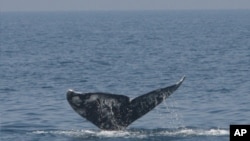About the same time early humans were learning to make fire, a tiny marine plant disappeared from the Atlantic Ocean. Now, some 800,000 years later, it’s back.
The microscopic algae was previously blocked by Arctic ice. However, melting glaciers have opened a channel for the algae to make the trip from the Pacific Ocean, where it is abundant.
Open waters
The last time water flowed free between the Pacific and Atlantic was two to three million years ago, says oceanographer Philip Reid of the Sir Alister Hardy Foundation for Ocean Science.
“And other species in the Atlantic were almost certainly made extinct and there is the danger that this could happen again. If the ice retreats further, as is expected, within possibly 40 years time, the whole of the Arctic Ocean could be ice-free in summer months of the year.”
Reid, who reported the event in the Journal Global Change Biology, says the algae - which plays a key role in helping absorb carbon from the atmosphere in the Pacific - is now well established in the Atlantic, as far south as New York.
It’s unknown whether the changes are having an impact on other species. What’s more significant, he says, is that it is an indicator of change and of what we might see in the future.
One thing is certain. Arctic ice is melting at an accelerating rate and the oceans are warming. Studies show the last six years - between 2005 and 2010 - were the warmest years recorded in the Arctic since measurements began in 1880.
Curious comeback
Another curious event was the appearance, last year, of a Pacific grey whale in the Mediterranean Sea.
Grey whales, once common in the Atlantic, were hunted to extinction 300 years ago, says Katja Philippart, a marine biologist with the Royal Netherlands Institute of Sea Research. She says the most plausible explanation for the grey whale’s appearance is the opening of the Arctic waters.
Philippart is coordinator of the Climate Change and European Marine Ecosystem Research Project or CLAMER, a joint effort among 17 marine institutes in 10 European countries.
CLAMER is gathering data from 300 climate-related studies from the last 13 years that focus on Europe’s oceans and coastal waters as well as the Mediterranean, Baltic and Black Seas.
Timing shift
Philippart observes three broad trends: the opening of the arctic, the movement of sea life northward and the shift in timing of how animals and plants grow.
Warmer waters and other changing conditions mean some prey species are no longer available when their predators need them.
Philippart cites the example of the Atlantic puffin, a seabird that breeds off the coast of Norway.
“They lay their eggs at such a time that if the chicks need food, the young herring is passing along the coastline and they take it and bring it to the young," she says. "But the recent advancement of this timing of the herring, so now the herring passes before the chicks are hatched from the eggs, meaning that once the chicks are there and hungry the herring has already passed and the puffins don’t have the herring anymore to feed to their young.”
Mixed consequences
Overall, Philippart says, the CLAMER studies show that this re-arrangement of marine life will likely have mixed consequences.
“It could be for the good. It could be for the worse. It could be different from area to area. So some places stocks are declining and other areas stocks are growing and that makes it hard. So we can only indicate: Be prepared for change.”
Philippart adds that it is important to continue ocean research to determine how best to adapt to the inevitable climatic changes.
Project CLAMER concludes with an international conference in Brussels in September.











